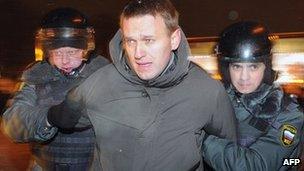Russia election: Police arrest 550 at city protests
- Published
Police in Russia have made 550 arrests after protests against Vladimir Putin's election as president, with protest leader Alexey Navalny among those held.
They detained 300 people in central St Petersburg out of a crowd of about 800 protesters, according to local police.
A further 250 were detained in the capital Moscow, including Mr Navalny, who was later released.
Foreign states have accepted Mr Putin won on Sunday but observers said the poll had been skewed in his favour.
UK Prime Minister David Cameron phoned Mr Putin to say he was looking forward to working with him to "overcome the obstacles in the relationship between Britain and Russia and build deeper political and trade links", a statement from Downing Street said.
French President Nicolas Sarkozy congratulated Mr Putin, urging him to "continue democratic and economic modernisation".
Earlier, French Foreign Alain Juppe said the election "has not been exemplary", but added that Mr Putin's victory was not in doubt.
The US and the EU have asked the Russian government to investigate the allegations of irregularities.
Tweeting from custody

Mr Navalny says "swindlers and thieves" rule Russia
Mr Navalny, a lawyer who blogs about corruption in Russia, said in a message via Twitter that he was being charged with an administrative offence.
He said he was being allowed to see his lawyer and watch his own arrest on TV. He was released a few hours later.
Earlier, Mr Navalny and fellow leader Sergei Udaltsov both addressed a crowd of between 14,000 and 20,000 people on Moscow's Pushkin Square.
Mr Navalny said "swindlers and thieves" ruled Russia and only they, the protesters, could stop them.
It is believed that Mr Udaltsov had refused to leave the square after the rally and riot police began to clear the area.
Both men have been previously arrested for their opposition activities.
A parallel rally in support of Mr Putin was held on Moscow's Manege Square, beside the Kremlin, with reports of about 14,000 people attending.
Andrei Isayev, a senior official in the ruling United Russia party, began the rally with the slogan "Russia, Putin, victory", chanted back by the crowd.
More protests are planned at the weekend.
'Carousel voting'
Amid claims of widespread fraud in Sunday's presidential election, the Organisation for Security and Co-operation in Europe (OSCE) urged Russia to carry out a thorough investigation.
In a statement, external, monitors said that while all candidates had been able to campaign freely, there had been "serious problems" from the start.
"The point of elections is that the outcome should be uncertain," said Tonino Picula, co-ordinator of the OSCE mission.
"This was not the case in Russia. There was no real competition and abuse of government resources ensured that the ultimate winner of the election was never in doubt."
Earlier, Golos, a leading Russian independent election watchdog, said it had received more than 3,000 reports of voting fraud.
The watchdog said its own exit polls suggested Mr Putin had actually won just over 50% of the vote - a result that would still have elected him in the first round.
State TV exit polls had given him about 59% of the vote.
Other allegations, including videos purporting to show evidence of voting irregularities, have been circulating online.
There were reports of "carousel voting", with voters being bussed between polling stations to cast multiple ballots, and of people being paid to vote for Mr Putin.
Mr Putin has served two previous terms as president, from 2000 to 2008.
He moved into the post of prime minister in 2008 because of a constitutional ban on a third consecutive term as president.
He will return to the presidency in May - replacing his close ally Dmitry Medvedev - and remain in post until 2018, when he could then run for another six-year term.